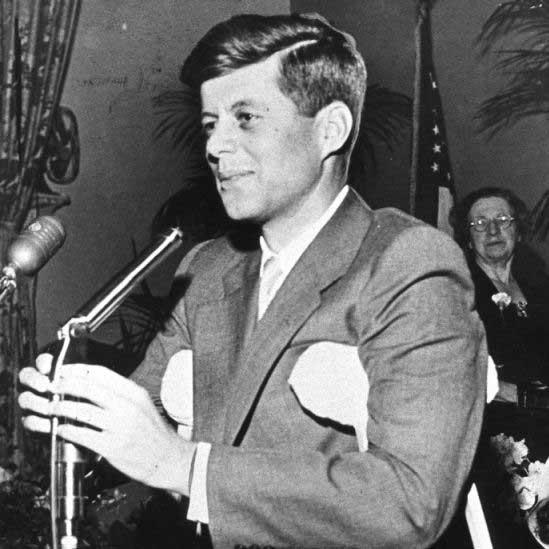Congressman

Congressman John F. Kennedy (on crutches) and his mother, Rose Fitzgerald Kennedy, at a campaign reception. Hotel Sheraton, Worcester, Massachusetts.
From the moment Congressman Kennedy arrived in the capital, he considered the House of Representatives a temporary stop on the way to higher office. The Congress seemed just too slow a place for him. As Congressman he concentrated on providing excellent services to the citizens of his district. The main area he concentrated on was trying to pass a bill to provide affordable housing for Veterans.
As a congressman, Kennedy had a hard time becoming used to the slow pace of the US House of Representatives. He viewed many of his fellow Congressmen as " old grey men" . When he came to the House, the Republicans were the majority party. Thus, a Democratic Freshman Congressman stood to have very little power. It was clear to him from the moment he arrived, that the House of Representatives would only be a stepping stone for him on the way to higher office.
Before he could begin a run for higher office, however, he had to accomplish two things. He had to show that he could be an effective Congressman, and he had to raise his public profile, both in Massachusetts and nationally. To ensure he was an effective Congressman, his father helped him assemble the staff members for both his District office, as well as his Washington DC office. His office operating costs in both locations were subsidized by his father, who also used his connection and money to see to it that Congressman Kennedy received an outsized amount of national publicity. Jack came to Congress knowing little about domestic issues, and his instincts towards fiscal conservatism were often at odds with the desire of his poor constituents, who wanted additional federal assistance programs.
Jack took a strong a position in favor of public housing, which he felt was desperately needed for returning veterans. That support proved very popular. By the end of his first term, Kennedy had also developed a reputation as one of the most eligible bachelors in Washington.
It was also during his first term, that Kennedy was finally diagnosed with Addison's Disease. At the time of his diagnosis, an effective long-term treatment was first being developed to replace the steroid hormone cortisol, which had terrible side effects. With the new treatment Kennedy could now expect to live a normal life.
Kennedy then began a string of public appearances outside of his district, fueling speculation he would pursue a Senate seat in 1948. His own polling suggested, however, that he would not win that election. So Jack resigned himself to several more years in the House.
In his second and third terms in the House, Jack became an outspoken opponent of Communism. He often took positions accusing the Truman administration of not being active enough in the fight against the Communists. Though he was not an active supporter of Joseph McCarthy and his " Red Baiting" , he shared some of McCarthy's concerns and expressed sympathy for many of his actions.
In January 1951, Kennedy again traveled to Europe. He was concerned about how the US might be able to defend Western Europe in the midst of the Korean War, which was depleting so much of the US resources. In a radio address carried by 540 stations after his return, Kennedy spoke about " Issues in Defense of Europe" . He continued to give many speeches on this subject and testified before the Senate committees looking at this matter. He gave a sober and restrained analysis of the situation. Now, he decided, Jack Kennedy was ready for higher office.
 >
>